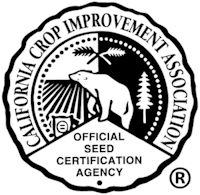Crop Standard Changes
September 2021 Quinoa standards added.
February 2019 In response to concerns raised by the sunflower industry, the CCIA has relaxed the standard for pollen shedding females in certified sunflower seed fields. The previous standard was 4:1,000. OECD standards allow for no more than 5:1,000 pollen shedding females. The AOSCA Yellow Book standards do not have a set level for pollen shedding females. The presence of pollen shedding females in fields intended for hybrid oil production is not a large concern for customers buying the seed. The new pollen shedding female standard is now 5:1,000.
September 2018 New isolation standards for foundation wheat. See October 2018 "Seed Notes" for details.
September 2016 AOSCA/CCIA standards change for sunflowers. "Fields must be isolated from flowering plants of other varieties, hybrids, strains, volunteer sunflowers, noncertified crops of the same variety, hybrid, or wild annual Helianthus species other than H. agrestis and total no more than 1:5,000 plants in the production field as a tolerance in isolation as follows." See Sunflower Standards for more information.
September 2016 AOSCA/CCIA standards change for wheat seed testing. "All wheat samples shall be visually assessed for kernels of contrasting color." See Grain Standards for more information.
June 2016 Cotton standards changed to remove all restrictions regarding FOV4 inspections. See May 2015 note below to review past restrictions.
May 2015 The cotton standards have been revised regarding the spread of FOV4. The standards changes pertain to resistant/tolerant varieties only. There is no change to the standards for susceptible cotton varieties. Please check the Cotton Standards for the updated standards and to view a list of resistant/tolerant and susceptible varieties.
February 2009 Three new crop standards have been added:
- Clover, Berseem
- Teff
- Turfgrass
All crop standards were updated with the addition of the following statement in the "Weeds" section:
"Prohibited and Restricted noxious weeds are listed in the California Seed Law/CA Code of Regulations/Sections 3854 and 3855."
January 2009 Variety amendment acceptance.
Amendments to variety descriptions, including variant tolerance, have in the past been approved without formal review or consideration by the original certification authority. Effective immediately, CCIA will require that the certification agency or review board that originally approved the variety accept the amendment before CCIA will recognize the amendment. If the variety was approved through CCIA's Certification Technical Committee (CTC), the amendment and supporting experimental data must be submitted to CCIA/CTC for review. The CTC will determine if the changes are substantiated and make a recommendation to the CCIA Board of Directors that the amendment be accepted. For example, variant tolerance amendments must provide credible data to support the request changing the frequency of variants from what was reported in the original variety described. Read the entire notice "Variety Amendment Acceptance Jan2009".
February 2008 There have been updates to the following standards:
- Corn
- Hybrid Corn
- Flax
- Rape
- Hybrid Rape
September 2007 There have been updates to the rice standards.
May 2007 There have been updates to the cotton standards.
September 2006
Rice Industry and Grower Members - view "Red Rice Info Sept2006".
September 2006
Larry Teuber appointed as new Executive Director - view "CCIA reorganization Sept2006".
Fee Changes
Current Application Fees
Current Certification Fee Schedule
Current OECD Fee Schedule
September 2023 The Board of Directors approved an increase in the minimum certification fee from $20 to $100, effective October 1, 2023. Rejected lots will also be charged $100.
February 2023 Turfgrass Fee Restructuring: The CCIA has conducted a review of the turfgrass certification program and determined revisions to the program fees are in order. The CCIA Board of Directors has approved the restructuring of the program fees.
Effective June 1, 2023 application fees will be $45/acre with a minimum application fee of $100. There will no longer be a $20 fee for turfgrass certificates. The goal of the fee restructuring is to align with industry standards and ensure producer compliance.
July 1, 2022 OECD fees increased from $0.15/cwt to $0.18 on all crops except corn. Corn fees increased from $0.26/cwt to $0.29/cwt.
July 1, 2019 OECD fees increased from $0.14 to $0.15/cwt on all crops except corn.
October 1, 2016 Seed Certification fees increase 10% on all crops.
July 1, 2016 OECD fees increased.
June 16, 2015 Research fees were adjusted at the June CCIA Board of Directors meeting for alfalfa and beans. This change is effective October 2015.
- Alfalfa research fees changed from $0.25 to $0.35/cwt
- Bean research fees changed from $0.20 to $0.40/cwt
June 19, 2014 Research fees were adjusted at the June CCIA Board of Directors meeting for small grains. This change is effective October 2014.
- Small grains research fees changed from $0.25 to $0.30/cwt
September 2011 Research fees were adjusted at the September CCIA Board of Directors meeting for beans and small grains. This change is effective April 2012.
- Bean research fees changed from $.15 to $.20/cwt
- Small grains research fees changed from $.22 to $.25/cwt.
September 2009 Research fees were adjusted at the September CCIA Board of Directors meeting for alfalfa and small grains.
- Alfalfa research fees changed from $.20 to $.25/cwt
- Small grains research fees changed from $.17 to $.22/cwt
General Announcements
June 2021 Canada thistle, a prohibited noxious weed, has been found in Yolo County. CCIA has a zero tolerance for prohibited weeds in any class of certified fields. If a grower does not remove the prohibited plants from the field, said field is automatically rejected, no matter the stage of the prohibited plant. Early detection and control is the best way to prevent the spread. Click here for more information on how to identify and control Canada thistle.
